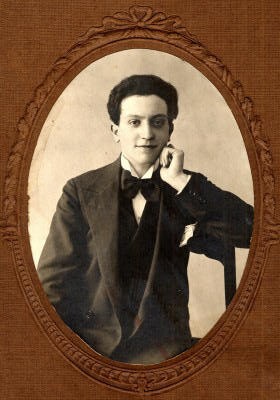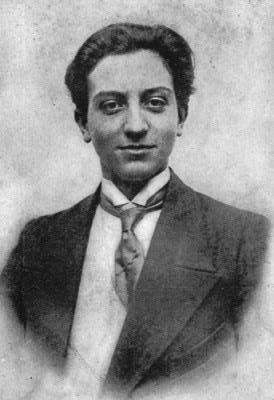

Vincenzo D'Annibale
Born: 1894Died: 1950
Education: Naple Conservatory
Career: Giovanni Edu
The unforgettable composer of the country of the sun, in 1934, collected in an elegant publication of four hundred out-of-print copies, twenty-four beautiful songs: twenty-four vermilion flowers blossomed from the very Neapolitan heart of Vincenzo D'Annibale, destined, above all, to bring to the exile the melancholy perfume of the distant land. The preface to the volume is by Libero Bovio, who entrusted the master, in addition to the verses of 'O Paese d'o sole, with many other suggestive poems. From the prose of Libero Bovio, who counted him among his most loyal friends, after more than thirty years, Vincenzo D'Annibale emerges alive and throbbing as in the good old days of Santa Lucia, of the Piedigrotta auditions, of the very Neapolitan outings which, often, it was he himself who organized. Here is a further excerpt: He was born of the people - this is the decoration of his coat of arms - and in the people he finds himself. To the small and flourishing industry of his father, he gave wider boundaries, wider scope. Art was his wish and guide: his sympathy made him popular; his intelligence gave him luck. He faced fights and blizzards smiling, with strange gleams in his bright eyes. He created, relentlessly, songs, gloves and children: three things to which he imprinted noble trademark. In his industrious day's work - his glove industry has now fully conquered the international market - he asks for only one prize: the joy of Art and of the family. His beloved bride and the sun-beautiful little athletes surround him, and he sings his melodious love songs from the piano. Later, when the city is all shadow and silence, he knocks on my door to beat me with a scopone and a tressette. One of his sons, VINCENZO, follows in his footsteps both in the industrial activity and in the field of music. In fact he took part in the Naples Festival in 1965 with Nu salute, verses by Tito Manlio, and set music to verses by Bonagura, De Crescenzo and others. His success: Casarella a Marechiaro (1917), 'A bumbuniera (1920), 'E denare d' 'o nfinfirinf (1924), 'O paese d'o sole (1925), Terra straniera (1926), Maggio m'ha scritto (1926), Tu ca si 'mamma (1927), 'A luna (1930), Vela surrentina (1933).

